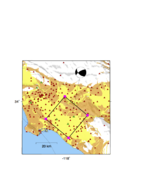Difference between revisions of "La Habra Simulation Region"
| Line 1: | Line 1: | ||
| − | |||
== Proposed Small Simulation Region == | == Proposed Small Simulation Region == | ||
High-F modelers have proposed to design a "small" 3D model for La Habra EQ that includes the closest 3 sites. We can then run tests with this model until the behavior of the codes and agreement of the results. This would only be a short term endeavor and I do not envision this being part of a paper (unless we discover something HUGE!), but it would help us move forward in a much more efficient and practical manner (as opposed to trying to run test cases with the full 3D volume). | High-F modelers have proposed to design a "small" 3D model for La Habra EQ that includes the closest 3 sites. We can then run tests with this model until the behavior of the codes and agreement of the results. This would only be a short term endeavor and I do not envision this being part of a paper (unless we discover something HUGE!), but it would help us move forward in a much more efficient and practical manner (as opposed to trying to run test cases with the full 3D volume). | ||
| Line 25: | Line 24: | ||
The above parameters give NX=1400, NY=1400, NZ=600, and and with set NT=60000 (60 sec). This took about 4 hours to run on the Caltech cluster using 864 processors (zero wait time in queue, too!). | The above parameters give NX=1400, NY=1400, NZ=600, and and with set NT=60000 (60 sec). This took about 4 hours to run on the Caltech cluster using 864 processors (zero wait time in queue, too!). | ||
| − | *[[Image: | + | *[[Image:base lahabra-win1.png|left|150px]] |
== Related Entries == | == Related Entries == | ||
*[[High-F]] | *[[High-F]] | ||
*[[Main_Page]] | *[[Main_Page]] | ||
Revision as of 20:32, 25 January 2016
Proposed Small Simulation Region
High-F modelers have proposed to design a "small" 3D model for La Habra EQ that includes the closest 3 sites. We can then run tests with this model until the behavior of the codes and agreement of the results. This would only be a short term endeavor and I do not envision this being part of a paper (unless we discover something HUGE!), but it would help us move forward in a much more efficient and practical manner (as opposed to trying to run test cases with the full 3D volume).
An additional benefit is that using a small model would make testing/iterating on UCVM development much more efficient. For example, modifications for RWG mesh output and testing/implementing velocity thresholds. As a potential starting point, here are the model parameters RWG used for his latest runs:
- set MODEL_LON = -117.99503 # LON at center of model region
- set MODEL_LAT = 33.86771 # LAT at center of model region
- set MODEL_ROT = -50.1 # counter-clockwise rotation of X_rwg from default azimuth of 090
- set XLEN = 28.0
- set YLEN = 28.0
- set ZLEN = 12.0
- set HH = 0.020
The map below shows this region (black rectangle) along with the epicenter and recording stations. Green triangles indicate sites where we have been comparing waveforms (FUL, DLA, BRE are inside this small region). The 4 corners of the proposed region (magenta circles) are:
- c1= -118.20819 33.85173
- c2= -118.01410 34.04473
- c3= -117.78178 33.88333
- c4= -117.97604 33.69068
The above parameters give NX=1400, NY=1400, NZ=600, and and with set NT=60000 (60 sec). This took about 4 hours to run on the Caltech cluster using 864 processors (zero wait time in queue, too!).
